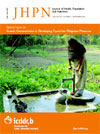
|
The Journal of Health, Population and Nutrition
icddr,b
ISSN: 1606-0997
EISSN: 1606-0997
Vol. 22, No. 4, 2004, pp. 413-419
|
 Bioline Code: hn04050
Bioline Code: hn04050
Full paper language: English
Document type: Research Article
Document available free of charge
|
|
|
The Journal of Health, Population and Nutrition, Vol. 22, No. 4, 2004, pp. 413-419
| en |
Knowledge of Men and Women about Reproductive Tract Infections and AIDS in a Rural Area of North India: Impact of a Community-based Intervention
Aggarwal, Arun Kumar & Duggal, Mona
Abstract
This study of a community-level health-education intervention on reproductive tract infections/sexually
transmitted diseases (RTIs/STDs) was conducted in three villages of Haryana in north India. The
study was aimed at increasing awareness among men and women of reproductive age about the prevention
and treatment of RTIs, modes of HIV/AIDS transmission, and methods of prevention. Health
education was imparted through one-to-one interactions with men and women during home visits, at
village-based clinics and health camps, and through health-education talks with men and women. Cumulative
effects of the intervention were examined at the end of the survey by comparing the change in
knowledge from the baseline. Records of clinic attendance were examined to assess the probable
impact of the intervention on clinic attendance. Baseline and follow-up evaluations revealed that there
was an improvement in the median total knowledge score of women from 0 to 6, whereas it remained
at 5 for men both at baseline and follow-up. Knowledge about RTI/STIs increased among both men
and women from the median score of 0 to 2 and from 0 to 3 respectively. The median knowledge score
on HIV/AIDS declined among men from 4 to 2 but increased from 0 to 3 among women. Clinic attendance
for RTI/STI cases, referred to the Naraingarh hospital, showed an eight-fold rise from an average
of four cases per month in 1998-1999 to an average of 35 cases per month in 1999-2000. The findings
of the study suggest that health-education strategy through home visits, RTI case management and
counselling, and organizing a weekly clinic and occasional camps and health-education talks can increase
the level of awareness about RTIs/STIs among both men and women and improve clinic attendance.
Keywords
Reproductive tract infections; Sexually transmitted diseases; Sexually transmitted infections; HIV; HIV infections; Acquired immunodeficiency syndrome; health education; Knowledge; attitudes; practice; Community-based studies; India
|
| |
© Copyright 2004 - The Journal of Health, Population and Nutrition
Alternative site location: http://www.jhpn.net
|
|
